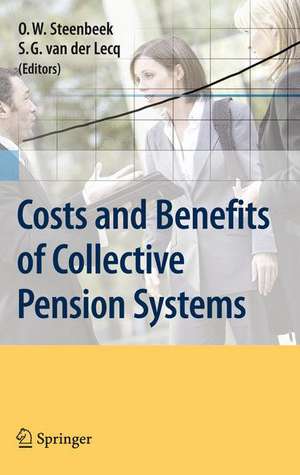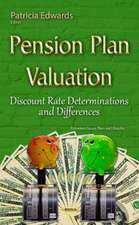Costs and Benefits of Collective Pension Systems
Editat de Onno W. Steenbeek, S. G. Fieke van der Lecqen Limba Engleză Hardback – 11 sep 2007
| Toate formatele și edițiile | Preț | Express |
|---|---|---|
| Paperback (1) | 625.67 lei 6-8 săpt. | |
| Springer Berlin, Heidelberg – 19 oct 2010 | 625.67 lei 6-8 săpt. | |
| Hardback (1) | 630.97 lei 6-8 săpt. | |
| Springer Berlin, Heidelberg – 11 sep 2007 | 630.97 lei 6-8 săpt. |
Preț: 630.97 lei
Preț vechi: 742.31 lei
-15% Nou
Puncte Express: 946
Preț estimativ în valută:
120.74€ • 127.32$ • 100.52£
120.74€ • 127.32$ • 100.52£
Carte tipărită la comandă
Livrare economică 11-25 ianuarie 25
Preluare comenzi: 021 569.72.76
Specificații
ISBN-13: 9783540743736
ISBN-10: 3540743731
Pagini: 260
Ilustrații: X, 247 p.
Dimensiuni: 155 x 235 x 19 mm
Greutate: 0.52 kg
Ediția:2007
Editura: Springer Berlin, Heidelberg
Colecția Springer
Locul publicării:Berlin, Heidelberg, Germany
ISBN-10: 3540743731
Pagini: 260
Ilustrații: X, 247 p.
Dimensiuni: 155 x 235 x 19 mm
Greutate: 0.52 kg
Ediția:2007
Editura: Springer Berlin, Heidelberg
Colecția Springer
Locul publicării:Berlin, Heidelberg, Germany
Public țintă
Professional/practitionerCuprins
The concept of solidarity.- Solidarities in collective pension schemes.- Solidarity: who cares?.- Quantifying solidarity.- Operating costs of pension schemes.- Optimal risk-sharing in private and collective pension contracts.- Intergenerational value transfers within an industry-wide pension fund —a value-based ALM analysis.- Intergenerational solidarity in the uniform contribution and accrual system.- Everyone gains, but some more than others.- Mandatory participation.- Why mandatory retirement saving?.- Mandatory participation for companies.- Conclusion.- Macroeconomic aspects of intergenerational solidarity.- Summary and conclusions.
Textul de pe ultima copertă
The Dutch pension system is often praised as one of the best in the world: it is efficient, it provides certainty to participants and it preserves cohesion and solidarity among workers and pensioners. This book presents these benefits in detail, supported by quantitative evidence. It also discusses the aspects of the system that are less favourable, however, such as implicit value transfers from younger to older generations that limit mobility of labour. The analyses of both benefits and costs will help pension fund managers, boards of trustees, supervisors, and researchers to understand and to improve pension systems currently in place around the world.
Steenbeek and Van der Lecq have assembled a rich combination of academic and practitioner chapters on the functions and dysfunctions of a collective pension system. These analyses carefully identify both the risk-sharing and value-transfer elements of the system and offer a powerful methodology for evaluating each and providing a systematic and objective means to evaluate such systems. Whether novice student or seasoned professional of collective pension issues, this work is a "must have" on the subject.
Robert C. Merton
John and Natty McArthur University Professor, Harvard Business School
Chief Science Officer, Trinsum Group
"The Dutch are the globe’s thought-leaders in the design and implementation of retirement income systems. This book offers the rest of the world a first-hand opportunity to learn why this is the case."
Keith Ambachtsheer, University of Toronto
Director, Rotman International Centre for Pension Management
"The Dutch experience, which this book so helpfully lays out, gives the rest of the world a model that is quite distinct from either the disappearing single-employer defined benefit approach and the rising individualistic defined contribution approach. That experience and this book challenge anyone interested in policies forlifetime financial security to consider systemic progress rather than ad hoc patches."
Brett Hammond
Senior Managing Director & Chief Investment Strategist TIAA-CREF Asset Management
"The Dutch think long and hard before adopting changes to their well-designed pension system. By contrast, the emergence of the individualistic 401(k) as the primary retirement income vehicle in the United States was clearly haphazard. Policymakers interested in improving our ‘accidental’ pension system have much to learn from this volume, which shows the benefits of a more considered and collective approach."
Alicia Munnell, Peter F. Drucker Professor of Management Sciences, Boston College Director, Center for Retirement Research, Carroll School of Management
"The reorganisation of pension systems is one of the great challenges we are facing today. This impressive collection of studies offers the specialist reader a comprehensive overview of the current debate."
Bert Rürup, Darmstadt University of Technology
Chairman, German Council of Economic Experts
Steenbeek and Van der Lecq have assembled a rich combination of academic and practitioner chapters on the functions and dysfunctions of a collective pension system. These analyses carefully identify both the risk-sharing and value-transfer elements of the system and offer a powerful methodology for evaluating each and providing a systematic and objective means to evaluate such systems. Whether novice student or seasoned professional of collective pension issues, this work is a "must have" on the subject.
Robert C. Merton
John and Natty McArthur University Professor, Harvard Business School
Chief Science Officer, Trinsum Group
"The Dutch are the globe’s thought-leaders in the design and implementation of retirement income systems. This book offers the rest of the world a first-hand opportunity to learn why this is the case."
Keith Ambachtsheer, University of Toronto
Director, Rotman International Centre for Pension Management
"The Dutch experience, which this book so helpfully lays out, gives the rest of the world a model that is quite distinct from either the disappearing single-employer defined benefit approach and the rising individualistic defined contribution approach. That experience and this book challenge anyone interested in policies forlifetime financial security to consider systemic progress rather than ad hoc patches."
Brett Hammond
Senior Managing Director & Chief Investment Strategist TIAA-CREF Asset Management
"The Dutch think long and hard before adopting changes to their well-designed pension system. By contrast, the emergence of the individualistic 401(k) as the primary retirement income vehicle in the United States was clearly haphazard. Policymakers interested in improving our ‘accidental’ pension system have much to learn from this volume, which shows the benefits of a more considered and collective approach."
Alicia Munnell, Peter F. Drucker Professor of Management Sciences, Boston College Director, Center for Retirement Research, Carroll School of Management
"The reorganisation of pension systems is one of the great challenges we are facing today. This impressive collection of studies offers the specialist reader a comprehensive overview of the current debate."
Bert Rürup, Darmstadt University of Technology
Chairman, German Council of Economic Experts
Caracteristici
Explicitly recommended by Robert C. Merton (nobel laureate), Bert Rürup (pension system advisor to the German Federal Government), Brett Hammond (Managing Director TIAA-Creff, a leading pension fund in the USA), and many others Includes supplementary material: sn.pub/extras














